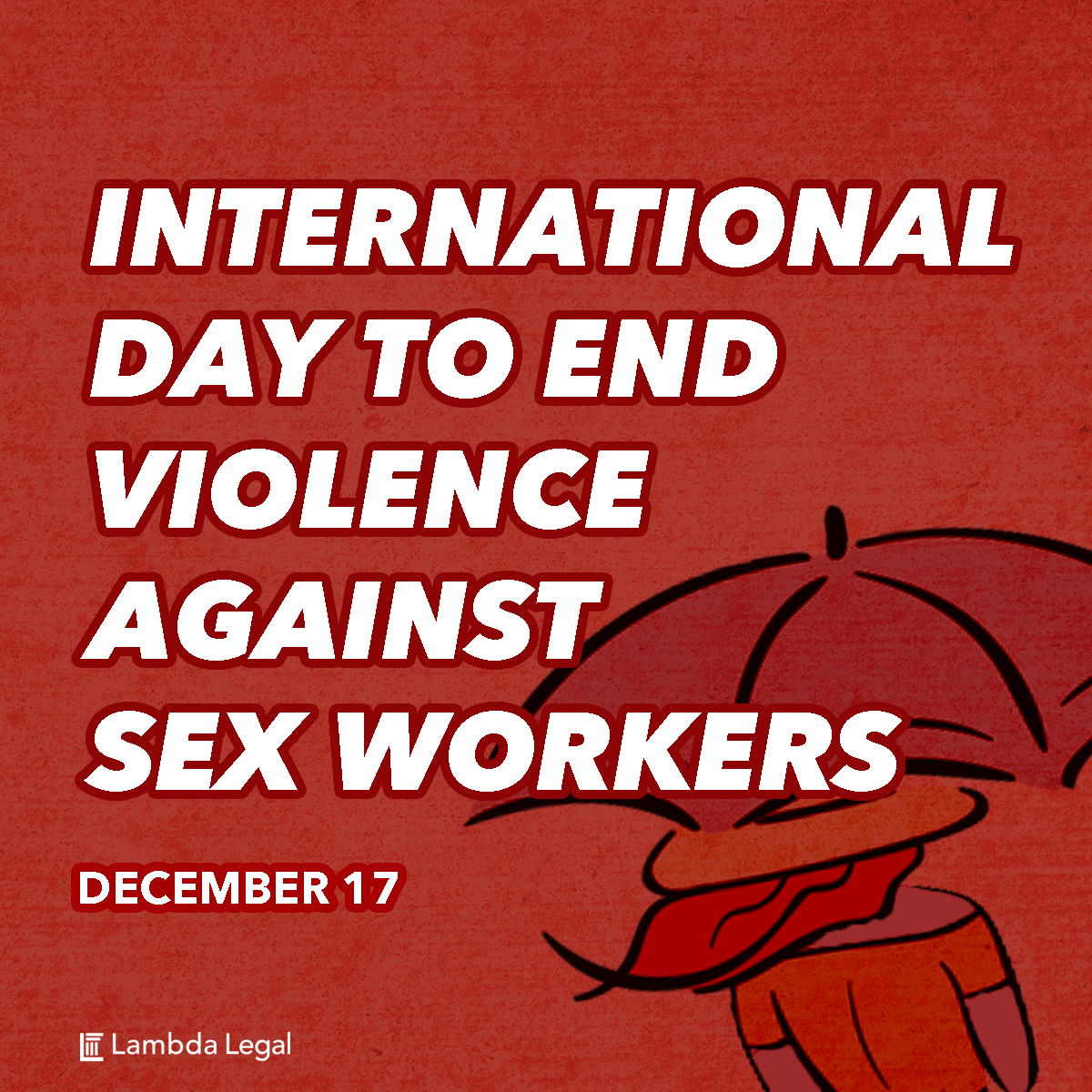The International Day to End Violence Against Sex Workers (IDEVASW) has been observed by sex workers, advocates, friends and allies since 2003. Since 2012, Lambda Legal has joined with partner coalitions to stand in solidarity with sex workers on this day and beyond.
We have come to understand and insist that full LGBTQ equality must include the decriminalization of sex work. It is our duty to elevate those most marginalized and defend our communities from harm. We stand in solidarity with sex workers.
This year, the House of Representatives will hear the introduction of a historic bill—the SAFE SEX Workers Study Act. If passed, the bill would require an assessment of impacts on the health and safety of sex workers when they lose the ability to use internet platforms as part of their work.
Sex workers already face violence from police, clients, and members of the public. In the aftermath of SESTA/FOSTA’s passage, sex workers have reported being pushed onto the street and into positions of greater vulnerability to violence. This bill takes a critical step in requiring a real assessment of the unintentional, harmful impacts of SESTA/FOSTA.
We must address the daily violence faced by people who trade sex. We must also name that this violence is sometimes exacerbated by well-intentioned policymakers. Sex worker advocates are leading the effort to address this violence, and this bill is one of many gains made by advocates this year.
On October 17, D.C.’s City Council’s Judiciary Committee held a hearing on the Community Safety and Health Amendment Act, a bill that removes criminal penalties for adults participating in consensual trade of sex. The bill was drafted largely by the Sex Workers Advocates Coalition, a diverse coalition led by local transgender women of color who trade sex.
In D.C., despite explicit non-discrimination protections for gender identity, the Office of Human Rights found in a 2015 study that 48% of employers appeared to prefer a less qualified cisgender applicant to a more qualified transgender applicant. Many trans women in D.C. (and nearly half of black trans women nationwide—44%), rely on sex work to meet their basic needs and supplement their income. We testified in support of this important bill.
The same day of the D.C. hearing, local journalists uncovered a pattern of abuse of sex workers by Metropolitan Police Department officers during stings, along with the Department’s failure to actually make arrests for human trafficking. This underscored the cruel absurdity of MPD’s current approach to policing the sex trade—diverting resources from investigating and preventing exploitation to subject sex workers to humiliation, degradation, and sexual violence.
Clearly, change guided by the communities most impacted is needed in D.C.
In New York, a broad coalition introduced bills to repeal charges for “loitering for the purposes of prostitution,” provide survivors expanded relief to vacate all types of criminal convictions resulting from their trafficking and exploitation, and to decriminalize providers, consumers, and those who provide physical spaces for sex work.
As with MPD, the NYPD’s record of policing sex workers is disturbing. Legal Aid attorneys have called for an investigation of the Vice unit after noting repeated abuse of their clients—who are then arrested for prostitution.
Support for decriminalizing sex work is starting to become a litmus test of the strength of politicians’ support for queer communities of color, which disproportionately experience poverty (a primary driver of sex work) and incarceration due to systemic discrimination. Recently, Representative Ayanna Pressley called for decriminalizing sex work in a bold resolution for reforming the criminal legal system—the People’s Justice Guarantee.
And while no endorsements for full decriminalization of sex work have been made by any major presidential candidate, most have faced the question—a significant shift from prior elections. At the local level, the new San Francisco District Attorney Chesa Boudin has indicated he will not prosecute prostitution arrests (as well as other quality of life crimes).
A recent Johns Hopkins study found that the vast majority of sex workers (78%) reported abusive police encounters within their lifetime. Many (41%) reported daily or weekly encounters with police, and the study found a correlation between abusive police encounters and client-perpetrated violence.
Any proposed solution that relies primarily on more policing and is not centered on the needs of sex workers and those directly impacted by criminalization will not substantially improve the health and safety of sex workers. As data show, policing of sex work directly and indirectly causes violence for people who trade sex, and such harm will continue as long as sex work is criminalized.
The SAFE SEX Workers Study Act is an essential step in the right direction, seeking to truly understand in a rigorous manner the factors that influence the health and safety of people who trade sex in the United States. The results of the study will be critical to understanding how to craft solutions that would mitigate violence experienced by people who trade sex.
At the conclusion of a year in which sex worker advocates have gained significant momentum at local, state, and national levels, the SAFE SEX Workers Study Act represents an important recognition of and action to address problems that have visited long-standing harms on our communities.





